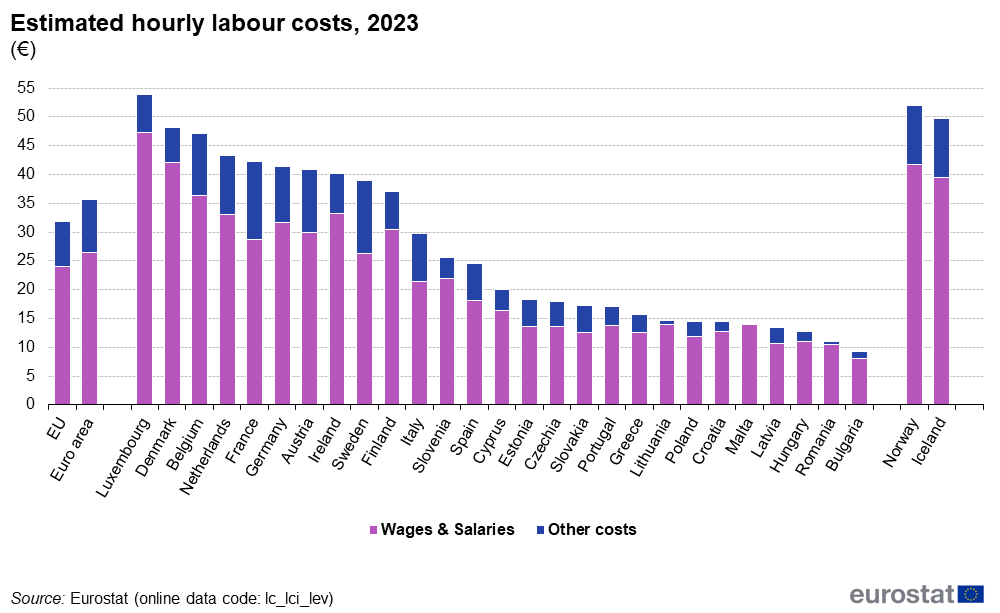Belgium's hourly labour costs remain among the highest in the European Union and eurozone. Since 2020, the hourly wage in Belgium has risen by almost €7, again putting the country among the top in Europe.
In 2023, the average hourly labour costs in the whole economy (businesses with ten or more employees) were estimated to be €31.80 in the EU and €35.60 in the eurozone, up from €30.20 and €34, respectively, in 2022, data published by Eurostat on Wednesday showed. However, this average masks sizeable gaps between EU Member States, with an almost €45 gap between the lowest and highest hourly labour costs.
In Luxembourg, the cost incurred by employers is the highest at €53.90 per hour, up from €50.90 in 2022 (+6%). In second place was Denmark, where companies fork out €48.10 per hour for their employees on average.
Belgium once again landed in third place. Here, the hourly labour cost was €47.10 in 2023, up from €43.50 in 2022 (+8.1%). Since 2008, when the hourly cost was €32.90, it has increased by almost €15 per hour.
The fastest increase was recorded between 2020 and 2023, largely driven by the country's automatic wage indexation system which saw the wages of the majority of employees go up significantly due to skyrocketing inflation.
On the other end of the spectrum, the lowest hourly labour costs were recorded in Bulgaria (€9.30) and Romania (€11), up from €2.60 and €4.20 in 2008, respectively. In third place was Hungary (€12.80).
The Central European country did report the largest increase in labour costs (+17.0% compared to 2022, but considering the lower starting point, the money employees earn remains much lower. Romania (+16.5%), Bulgaria (+14%) and Poland (+12.4%) also recorded high increases. The hourly cost increased the least in Denmark (+2.7%)
Within the eurozone, hourly labour costs increased in all EU Member States, and the largest increases were recorded in Croatia (+14.2%), Lithuania (+12.4%) and Estonia (+11.7%).
Sectors with highest and lowest costs
The two main components of labour costs are wages and salaries on the one hand and non-wage costs such as employers' social contributions on the other. The share of non-wage costs in the whole economy was 24.7% in the EU and 25.5% in the eurozone. In Belgium, this percentage is slightly lower, at 23%.
The highest shares of non-wage costs were recorded in Sweden (32.2%) and France (31.9%), while the lowest were observed in Malta (1.4%), Romania (5.0%) and Lithuania (5.4%), meaning employees here get the fewest benefits.
In the EU, hourly labour costs were the highest in the mainly non-business economy (including employees in education, health and social care and the arts) at €32.40 per hour and the lowest in the construction sector (€28.50).
The gap between the economic activity where employers incurred the highest and lowest costs was larger in the eurozone. Here, industry is the highest-paying sector (€38 per hour) and construction the lowest (€31.90 per hour).
In services, hourly labour costs varied between €31.80 on average in the EU and €34.80 in the eurozone. In the eurozone, labour costs for teachers, healthcare, social care staff and others in the mainly non-business economy were €35.70.


